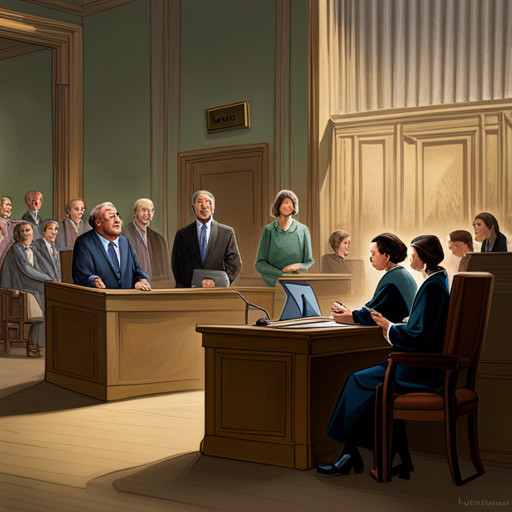Why Credible Injury Victims Are Offered More Insurance Compensation
This article explores the correlation between the perceived credibility of injury victims and the insurance compensation they receive.

By examining various factors such as personal history, appearance, demeanor, and post-injury actions, it provides an understanding of how these influence settlements.
The analysis further discusses the strategies insurance companies employ to assess credibility, and provides insights on how victims can enhance their credibility to secure fair compensation.
Key Takeaways
- Credible injury victims receive higher insurance settlements.
- Believable injury victims are more successful in court.
- Adjusters offer more money to trustworthy and believable victims.
- Personal history, background, appearance, demeanor, and actions after the injury all impact credibility.
Understanding the Role of Credibility in Injury Claims

The role of credibility in injury claims is significant, as it is a key determinant in the amount of insurance compensation offered to victims, with credible victims receiving higher settlements due to their perceived trustworthiness and believability.
Multiple factors affecting credibility assessment in injury claims have been identified, including personal history, demeanor, and actions post-injury. Moreover, the circumstances leading to the injury can greatly influence credibility.
Strategies to build credibility in injury compensation cases include active community participation, maintaining honesty and consistency, and prompt action following an injury. Additionally, ensuring proper documentation and securing reliable witnesses can considerably enhance credibility.
Thus, understanding and building credibility can significantly impact the outcome of injury compensation cases.
The Approach of Insurance Companies to Injury Claims

Assessment of claims by insurance companies involves meticulous investigation into the circumstances surrounding the incident, the credibility of the claimant, and the extent of damage or loss incurred. Factors affecting settlement offers include the claimant's credibility, severity of injury, and perceived willingness to litigate.
Insurance adjusters weigh these factors carefully, often offering higher settlements to claimants who demonstrate reliability and truthfulness. Additionally, the strategies for maximizing compensation often involve prompt reporting of incidents, diligent documentation of injuries, and consistent, truthful accounts of the event.
Seeking legal counsel is also a beneficial strategy as professional guidance can assist in navigating negotiations, potentially resulting in increased settlement offers. This careful consideration of factors and strategies underscores the intricate approach of insurance companies to injury claims.
How Believability Impacts Settlement Offers

Believability significantly influences the financial proposals made by adjusters during settlement negotiations, with those perceived as trustworthy typically receiving higher amounts. This credibility stems from various factors such as consistency in the victim's narrative, demeanor, personal history, and promptness in reporting the injury.
| Factors Affecting Settlement Offers | Impact on Credibility | Strategies for Maximizing Compensation |
|---|---|---|
| Consistency in Narrative | High | Maintain consistency in recounting events |
| Demeanor | Moderate | Maintain a composed and respectful demeanor |
| Personal History | High | Minimize negative aspects of personal history |
| Promptness in Reporting Injury | High | Report the injury immediately and accurately |
| Evidence | High | Gather and preserve all relevant evidence |
These factors and strategies underscore how believability can be harnessed to maximize compensation in insurance settlement negotiations.
The Influence of Personal History on Credibility

Personal history significantly impacts the perception of trustworthiness during settlement negotiations. Elements such as criminal records, employment stability, and community involvement play crucial roles. The role of past experiences in shaping the perception of a claimant's credibility cannot be ignored.
For instance, a claimant with a criminal history may face challenges in establishing credibility. Past actions may cast doubts on their character and truthfulness. Furthermore, steady employment signals reliability and predictability, factors that insurance adjusters might consider favorably.
Active community involvement, on the other hand, can enhance the claimant's image as a responsible and trustworthy individual. Therefore, understanding the impact of personal history on credibility is crucial in the context of injury compensation negotiations.
The Significance of Appearance and Demeanor in Credibility Assessment

Appearance and demeanor play a significant role in the evaluation of trustworthiness during settlement negotiations. The role of appearance and demeanor in credibility assessment extends to factors such as confidence, body language, and consistency in recounting the incident. These elements may indirectly influence the perceived credibility of an injury victim.
Factors impacting believability in injury claims involve a multitude of aspects, including but not limited to:
- Consistency and clarity in narration of events
- Physical evidence supporting the injury claim
- Medical records and professional opinions substantiating the injury
It is noteworthy that the presentation of these factors forms a collective impression on the evaluators, ultimately shaping their assessment of the victim's credibility and, by extension, the probable outcome of the negotiation.
The Importance of Post-Injury Actions and Statements

Following the discussion of appearance and demeanor in credibility assessment, it is imperative to shed light on the pivotal role of communication after an injury. Actions and statements post-injury significantly influence the assessment of the victim's credibility. The impact of consistent statements on credibility cannot be overstated. Demonstrating consistency in recounting the event fosters trust and credibility, aiding in securing fair insurance compensation.
| Actions Post-Injury | Impact on Credibility |
| Detailed, consistent accounts | Boosts credibility |
| Timely communication | Demonstrates seriousness, accountability |
| Evidence of immediate medical attention | Validates the injury, shows responsibility |
| Consultation of a skilled attorney | Shows commitment to the case |
Thus, enhancing credibility involves not only personal demeanor and appearance but also post-injury actions and communication.
The Impact of Circumstances Leading to the Injury

Circumstances that precede an incident significantly influence the perception of an individual's credibility and can, therefore, affect the settlement of a claim. Pre-existing conditions, for instance, can cast doubt on the legitimacy of subsequent injuries claimed. An individual with a history of similar injuries may find their credibility questioned, impacting the resolution of their claim.
The impact of pre-existing conditions on credibility can be mitigated with robust medical documentation, establishing a clear distinction between past and current injuries.
Surveillance footage plays a pivotal role in credibility assessment, providing objective evidence of the incident and potentially validating the claimant's account.
Past incidents, if any, should be discussed openly and honestly, with full disclosure to insurers to maintain credibility.
In essence, pre-incident circumstances can significantly sway the perception of credibility, thereby influencing the claim's outcome.
Enhancing Credibility: Practical Tips for Injury Victims

Enhancing personal trustworthiness is a fundamental strategy for those seeking to secure fair settlements for their bodily harm claims. Building trust with insurance adjusters requires honesty, consistency, and transparency.
Active community involvement can also significantly bolster credibility, as it reflects positively on character and reliability. It is essential to provide detailed, consistent information throughout the claim process, demonstrating reliability and seriousness about the claim. Any delay in reporting the injury or inconsistency in the account could impact credibility negatively.
Appearance and demeanor also play a significant role, with a professional appearance often perceived as more trustworthy. Therefore, it is advised to maintain an active, positive community presence, be honest and consistent in communication, and exhibit professionalism at all times.
The Consequences of Delayed Reporting on Credibility

Delayed reporting of an incident can significantly impact the perceived reliability of the claimant, often resulting in skepticism from adjusters and potential devaluation of the claim. The importance of timely reporting cannot be overstated, as it aids in maintaining consistency in the victim's account of the incident, further enhancing their credibility.
The consequences of inconsistent accounts can be severe, including reduced settlement amounts and even claim denial.
Timely reporting allows for the prompt collection and preservation of evidence, crucial for supporting the claimant's narrative.
Delayed reporting can result in the loss or distortion of key details, thereby weakening the claim.
Thus, the immediate reporting of incidents is a critical factor in ensuring the credibility of injury victims and maximizing potential claim compensation.
The Role of Reliable Witnesses in Strengthening Credibility

Reliable witnesses play a crucial role in bolstering the authenticity of a claim, as their consistent and detailed accounts can substantiate the narrative of an incident. The role of witness testimony in strengthening credibility through witnesses cannot be understated. It has the potential to sway the course of a claim in favor of an injury victim, significantly impacting the outcome. A witness providing a consistent, coherent account corroborates the victim's recounting of the event, thereby enhancing the credibility of the claim and the victim.
The table below illustrates the importance of reliable witnesses:
| Role of Witness Testimony | Impact on Credibility |
| Provides consistent account | Strengthens credibility |
| Corroborates victim's story | Enhances authenticity |
| Offers unbiased perspective | Increases trust |
| Supports evidence | Bolsters claim |
| Reveals new information | Broadens understanding |
Thus, reliable witnesses play a vital part in strengthening the credibility of an injury claim.
Key Steps in Protecting Your Right to Injury Compensation

Undeniably, taking immediate and informed steps after an incident is crucial in ensuring one's right to recompense in personal damage cases. Understanding the claims process is fundamental, as it provides a comprehensive view of the necessary actions to be taken.
Firstly, it is essential to gather and preserve all relevant paperwork and evidence, including photographs of the incident scene and injuries.
Secondly, seeking medical attention promptly is vital, as delay could be detrimental to the credibility of the case.
Lastly, consultation with a competent personal injury attorney is recommended to safeguard rights and navigate the negotiation process if needed.
The Relevance of Properly Documented Injuries in Credibility Assessment

Proper documentation of physical harm significantly contributes to the assessment of authenticity in personal damage claims. An evaluation of credibility is critically influenced by the relevance of medical records, photographs, and witness statements. These elements provide tangible evidence, strengthening the credibility of the claimant.
| Medical Records | Photographs | Witness Statements |
| Detail extent of injury | Visual proof of injury | Corroborate claimant's account |
| Confirm treatment received | Show accident scene | Provide third-party perspective |
| Indicate recovery progress | Highlight severity of damage | Support consistency in claimant's account |
| Demonstrate adherence to medical advice | Document injury progression | Validate timing and location of incident |
| Reinforce ongoing medical needs | Reinforce the reality of physical harm | May testify in court if necessary |
The role of consistent and detailed documentation, thus, becomes paramount in reinforcing the veracity of personal damage claims.
The Importance of Legal Assistance in Injury Compensation Claims

Transitioning from the significance of documented injuries in credibility assessments, the focus now shifts to the importance of legal assistance in injury compensation claims. It must be underscored that the role of legal representation in such situations is critical.
Legal professionals possess the necessary expertise to guide claimants through complex legal processes, ensuring that their rights are upheld. The benefits of professional guidance include:
- Appropriate interpretation of intricate legal language and procedures.
- Effective negotiation with insurance companies for fair compensation.
- Mitigation of potential legal pitfalls that could jeopardize the claim.
In essence, professional legal guidance not only simplifies the process but also significantly increases the chances of achieving a favorable outcome in injury compensation claims. Thus, it is an indispensable element in the quest for justice and fair compensation.
Frequently Asked Questions
How Does the Credibility of a Victim Affect the Determination of Fault in an Injury Claim?
Credibility Assessment Techniques significantly impact the determination of fault in injury claims. An individual's credibility can influence the interpretation of evidence, and consequently, the outcome of the claim.
The importance of evidence correlation is paramount in this process. A credible victim's account, when corroborated by compelling evidence, can solidify their position, leading to a more favorable insurance settlement.
Thus, credibility plays a crucial role in the adjudication of fault in injury claims.
Can a Victim’s Credibility Impact the Length of the Claim Settlement Process?
A victim's credibility can significantly impact the duration of the claim settlement process.
Enhanced credibility, achieved through unbiased reporting and consistent narratives, may expedite the process as insurance adjusters perceive less risk in fraudulent claims.
Conversely, a lack of credibility could prolong the process as additional investigations may be required to validate the claim.
Therefore, credibility plays a pivotal role in the efficiency of claim settlements in insurance.
Are There Any Specific Behavioral Traits That Can Negatively Influence a Victim’s Credibility?
Certain behavioral traits can indeed impair a victim's credibility. For instance, dishonesty, particularly lying about aspects of the injury or accident, has significant consequences. Similarly, apparent victim coaching, wherein the victim appears excessively prepared or rehearsed, can negatively influence perception. Observations of these behaviors may lead to skepticism from insurance adjusters, potentially resulting in lower settlement offers.
Therefore, it is crucial for victims to present their cases honestly and naturally.
How Can a Victim Demonstrate Their Credibility When There Are No Direct Witnesses to the Incident?
In the absence of direct witnesses, a victim can attest their credibility through meticulous documentation of the incident, prompt medical attention, and consistent recounting of events.
Techniques for credibility evaluation, such as polygraph testing, could be employed.
Legal representation can facilitate effective communication with insurance adjusters, ensuring the victim's narrative is coherent and credible.
Notably, maintaining an unblemished personal record can also contribute to the credibility of the victim.
Does the Insurance Company’s Perception of the Victim’s Credibility Have Any Effect on the Possibility of Future Insurance Coverage?
The perception of a victim's credibility by an insurance company indeed influences future insurance coverage decisions.
Credibility influence can result in an insurance bias, either positive or negative.
A positive bias, stemming from proven credibility, may facilitate future coverage, while a negative bias, resulting from perceived deception or inconsistency, may hinder it.
Therefore, maintaining credibility is crucial not only for immediate compensation but also for potential future insurance engagements.

This post has been generated by AI and was not reviewed by editors. This is Not legal advice. Please consult with an attorney.




